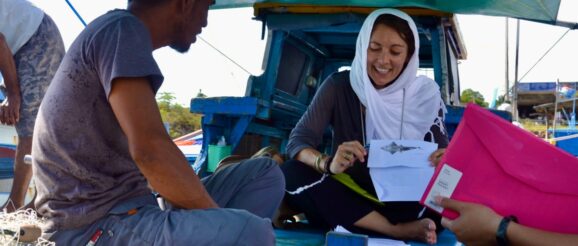Plain Language Summary: Understanding human behaviour to save endangered sharks – Relational Thinking


By Hollie Booth, Muhammad Ichsan, Rizky Hermansyah, Lailia Romah, Kusuma Bandanaira, Luky Adrianto, and E. Milner-Gulland.
This Plain Language Summary is published ahead of the article discussed; please check back for a link to the full paper.
Our team of researchers from UK and Indonesia applied methods from social and behavioural sciences to better understand why coastal fishers in Indonesia catch, retain, or avoid certain endangered shark species; and demonstrated how this data can be used to inform more effective and equitable marine conservation strategies.
Sharks are some of the world’s most threatened species. The main threat to these animals is overfishing, which occurs when the number of individuals killed due to fishing exceeds the rate at which the population grows. While some shark species are specifically targeted in fisheries, they are more frequently caught as ‘bycatch’ – i.e., they become trapped in fishing nets and lines which are targeting other commercially important species such as tuna, cod, and prawns. Bycatch is common and difficult to manage in small-scale fisheries, where coastal communities are highly dependent on fishing for food and livelihoods, and unselective nets and lines are used to opportunistically catch a variety of fish.
Given this complexity we developed an approach to redefine bycatch as a spectrum, which extends from ‘undesirable incidental catch’ to ‘valuable secondary catch’. The position of a species on this spectrum depends on fishers’ beliefs about the outcomes of bycatch-related behaviour, and this in turn influences which types of bycatch mitigation strategies may or may not be effective. We then adapted and applied methods from social psychology to ‘diagnose’ where a species falls on this spectrum, based on the beliefs of fishers in a small-scale fishery in Aceh, Indonesia, and demonstrated how the results can inform bycatch mitigation strategies.
We found that underlying economic, social, and cultural factors – including desire for food and income, opinions of local leaders and religious beliefs – can facilitate and inhibit fishers’ propensity to catch, avoid and release different species. This information can be used to inform more effective conservation strategies, which focus on changing norms, incentives, and salient beliefs about bycatch.
Our study demonstrates the importance of understanding human dimensions of bycatch, and the need for multi-pronged strategies which address underlying economic, social, and cultural barriers to bycatch mitigation.
